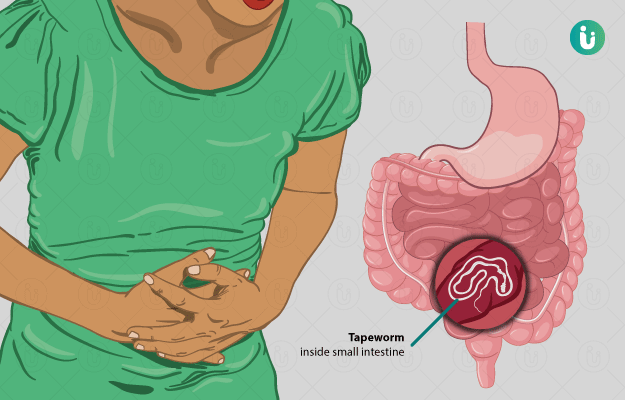What is tapeworm infection?
Tapeworms are flat worms that live inside a host’s (humans, animals) intestines. When tapeworms enter the human body through some source, they cause various biologic problems constituting tapeworm infection.
Tapeworm can also infect a person through their eggs or larvae.
What are its main signs and symptoms?
- The initial symptoms of tapeworm infection include nausea and vomiting. One may also develop fever, along with, weakness, fatigue, and diarrhoea.
- A person usually loses their appetite. On the contrary, they may also experience increased hunger (more than normal).
- If the worm migrates to other parts of the body, then there are symptoms like a headache and serious neurological problems like seizures.
- A patient can also develop allergic reactions and rashes due to allergens released by the tapeworm.
What are the main causes?
- Tapeworms can infect the human body from sources like infected beef and pork. Based on the source, there are six main types of tapeworms that infect humans.
- Eating raw or improperly cooked meat of an infected animal or drinking contaminated water can cause an infection.
- A person who eats food prepared by an infected person can also develop the infection.
- Poor personal hygiene like not washing one’s hands properly while handling food and cooking with unclean hands increases the risk of infection.
How is it diagnosed and treated?
- If you present with symptoms of a tapeworm infection, a stool sample is taken to check for eggs or worms in faeces.
- Sometimes multiple stool samples are collected, since the worm may be absent from a sample, but you can still have an infection.
- CT scans, MRI or ultrasound are also used for diagnosis, especially if you have a swelling in the abdomen or a suspected cyst.
- Blood tests will reveal if there is an infection in the body, and if antibodies are formed against tapeworms.
- Sometimes, a person will be completely asymptomatic while the tapeworm persists in the body.
- Medicines specific to this infection are prescribed. It is important to complete the entire course of the medicines.
- If there is pain or swelling, other drugs like anti-inflammatory medicines are also given, along with, anti-helminthic drugs like albendazole to kill the eggs and the worms.
- In severe cases, where there is a severe infection in the liver or the lungs, surgical removal is needed.
- Every patient must maintain good personal hygiene and consume a healthy diet to avoid being re-infected.

 Doctors for Tapeworm Infection
Doctors for Tapeworm Infection  OTC Medicines for Tapeworm Infection
OTC Medicines for Tapeworm Infection


















